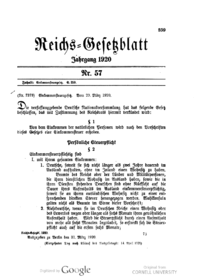Income Tax Act (Germany)
| Basic data | |
|---|---|
| Title: | Income Tax Act |
| Abbreviation: | EStG |
| Type: | Federal law |
| Scope: | Federal Republic of Germany |
| Legal matter: | Tax law |
| References : | 611-1 |
| Original version from: | October 16, 1934 ( RGBl. I p. 1005) |
| Entry into force on: | October 25, 1934 |
| New announcement from: | October 8, 2009 ( Federal Law Gazette I p. 3366 , ber.p. 3862 ) |
| Last change by: |
Art. 6 G of August 12, 2020 ( Federal Law Gazette I p. 1879, 1885 ) |
| Effective date of the last change: |
predominantly January 1, 2021 (Art. 8 G of August 12, 2020) |
| GESTA : | G034 |
| Weblink: | Text of the law |
| Please note the note on the applicable legal version. | |
The income tax law of the Federal Republic of Germany regulates the taxation of the income of natural persons .
In terms of tax revenue, the most important form of collection of income tax is wage tax . Other forms of collection are the general procedure ( determination through assessment , collection through notification, if necessary foreclosure ) and capital gains tax (including the interest discount ). In terms of tax liability, a distinction is made between unlimited and limited tax liability. Natural persons ( Section 1 BGB ) who have their place of residence ( Section 8 Tax Code ) or their habitual residence ( Section 9 AO) are subject to unlimited income tax on their world income. The factual tax liability extends to the seven types of income according to Section 2 Paragraph 1 Sentence 1 No. 1 to 7 EStG. The respective income is:
| Income type | legal basis |
|---|---|
| Income from agriculture and forestry |
§§ 13 to 14a EStG |
| Business income | §§ 15 to 17 EStG |
| Income from self-employment | § 18 EStG |
| Income from employment | Section 19 EStG |
| Income from capital | Section 20 of the Income Tax Act |
| Rental and leasing income | Section 21 of the Income Tax Act |
| Other Income | Section 22 of the Income Tax Act |
The Income Tax Act also applies to the taxation of legal entities (especially corporations, etc.). However, other tax laws, especially the corporate income tax law , contain special provisions that can supersede the provisions of the income tax law ( specialty principle ).
history
The original version of the Income Tax Act was passed by the German Reich government in 1934 on the basis of Article 1 of the Act to Eliminate the Need of the People and the Reich of March 24, 1933 ( Enabling Act ), under the thereby legalized dictatorial elimination of parliament in questions of legislation , signed and made out by Chancellor Adolf Hitler . The main features of the law are based on the legal regulations that have been in force since 1920.
In the Control Council Act No. 12 of February 11, 1946, a sharp increase in the tax rate was decided. Due to the subsequent currency reform and several tax laws that provided for tariff reductions or tax concessions, this increase in the tariff was partially moderated again.
The EStG was last published on October 8, 2009 in the Federal Law Gazette of October 13, 2009 ( Federal Law Gazette I p. 3366 , 3862 ) on the basis of Section 51 (4) number 2 of the Income Tax Act in the version published on October 19, 2002 ( Federal Law Gazette I p. 4210 ; 2003 I p. 179 ) in the version valid since September 1, 2009.
See also
- Income tax reform
- Income tax (Germany)
- Tariff history of income tax in Germany
- Income tax return
- Income tax in Austria
literature
- Kirchhof (Ed.): Income Tax Act . 14th revised edition. Publishing house Dr. Otto Schmidt, Cologne 2015, ISBN 978-3-504-23095-1 .
- Ludwig Schmidt (founder), Heinrich Weber-Grellet (ed.): EStG. Income Tax Act. 32nd edition. CH Beck, Munich 2013, ISBN 978-3-406-63500-7 .
Web links
- Text of the Income Tax Act
- Legal text in the Reichsgesetzblatt from 1934 (RGBl. I pp. 1005-1018)
- Overview of changes made and planned to the EStG since January 1, 1999
- Extensive changes since December 31, 2005
Individual evidence
- ^ Paul Kirchhof : The order for the renewal of income tax law , in: Taxation of income, publications of the German Tax Law Society , Vol. 24, Cologne 2001, p. 5.
- ↑ Gierschmann, Gunsenheimer, Schneider: Textbook income tax (15th Edition), p 65, para. 1
